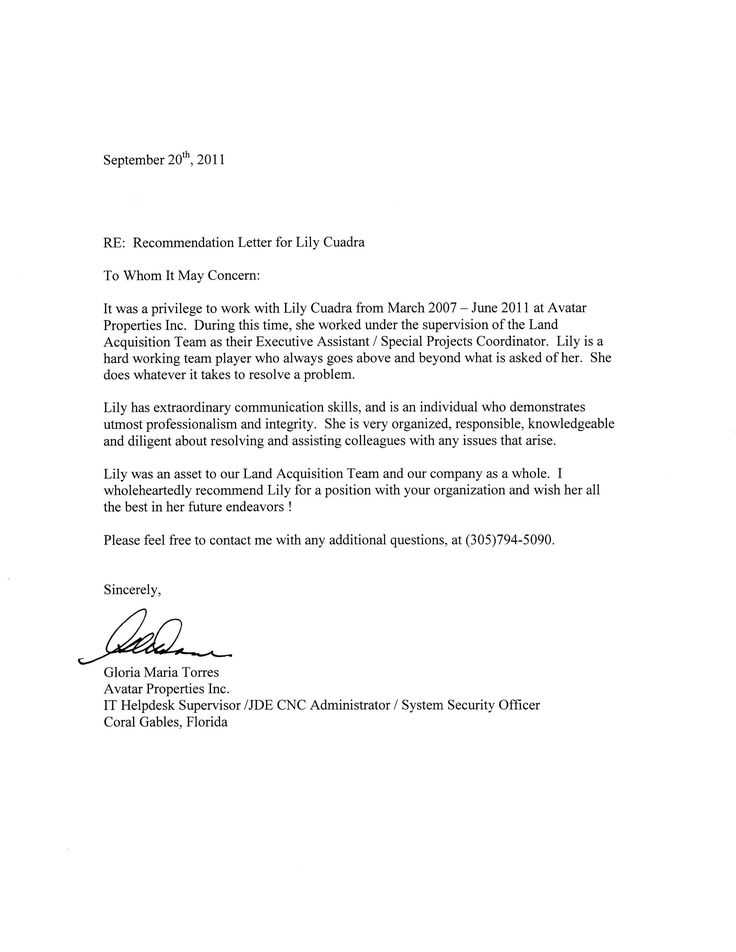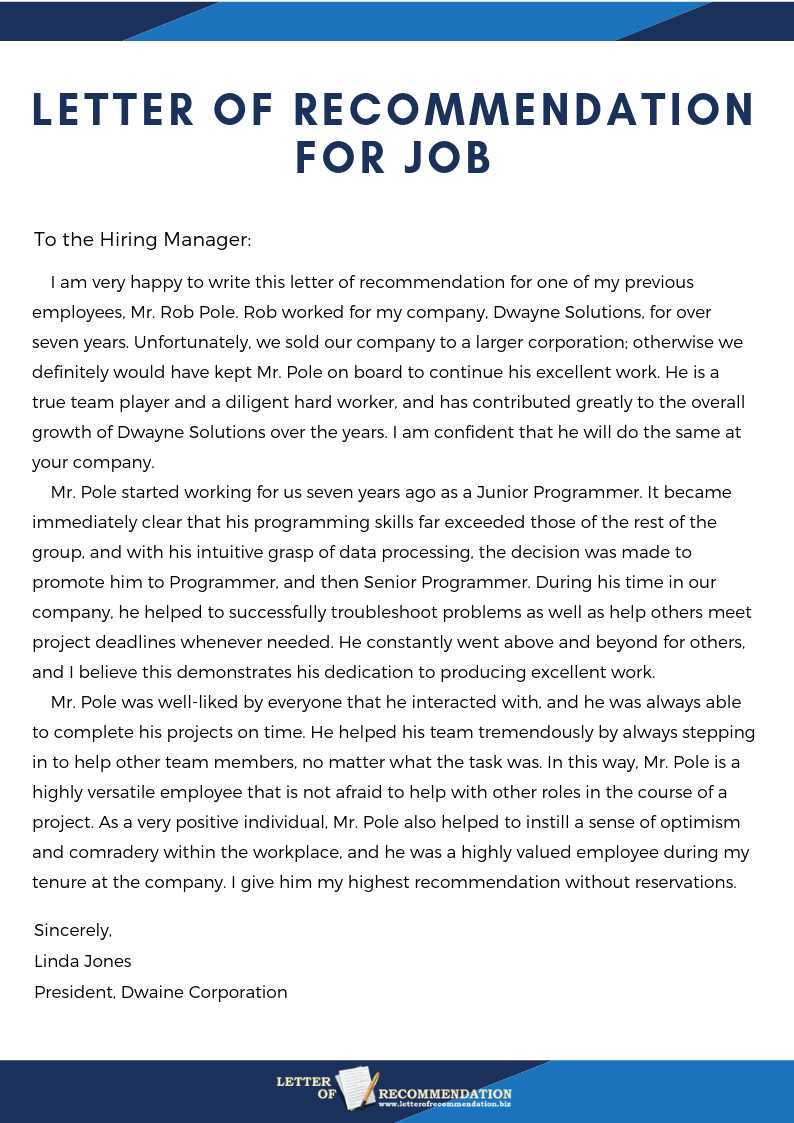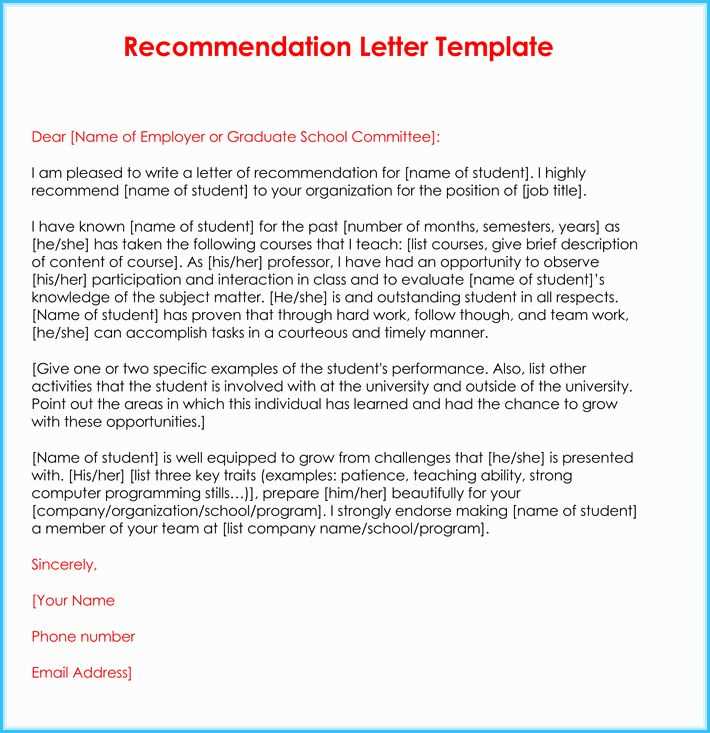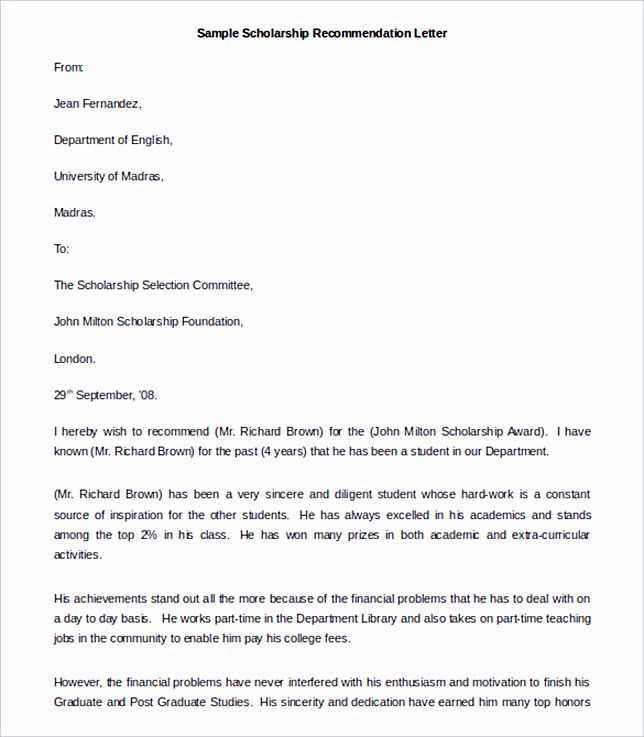Letter of Recommendations Template for Various Purposes

In many situations, a well-crafted endorsement can make a significant difference. Whether you’re applying for a job, admission to a program, or seeking personal references, having a strong recommendation can set you apart from the competition. Knowing how to structure and present such an endorsement is crucial for its success.
Understanding the key elements of an effective recommendation is essential. From highlighting specific skills to showcasing personal qualities, a well-written endorsement can convey a lot about a person’s abilities. This guide will provide insights into creating impactful statements of support tailored to different needs.
Tailoring each endorsement to the specific context is vital for making a lasting impression. Adjusting tone, content, and focus ensures that the message resonates with the intended audience, whether it’s a hiring manager or an admissions committee. The right format will ensure clarity and professionalism in presenting the individual’s qualifications and strengths.
Why You Need a Letter of Recommendation
Having a personal endorsement can significantly impact your professional or academic journey. These documents provide a third-party perspective on your abilities, highlighting strengths that may not be apparent from your own application materials. They serve as a powerful validation of your qualifications, skills, and character.
Here are several reasons why having a strong endorsement is essential:
- Demonstrates Credibility: A well-written endorsement from a trusted individual enhances your credibility, offering proof of your achievements and reliability.
- Shows Support from Others: It provides evidence that you have earned the respect and trust of others in your field or personal circle.
- Highlights Unique Qualities: A personal endorsement can showcase specific traits or experiences that set you apart from other candidates.
- Increases Your Chances: When applying for a job, school, or other opportunities, an endorsement can improve your chances of being noticed by decision-makers.
Ultimately, these documents can open doors to new opportunities and provide a competitive edge in a crowded field. The value of a strong, well-structured statement of support cannot be overstated, especially when it is tailored to the specific needs of the recipient.
Types of Letters of Recommendation

There are various kinds of endorsements that can be written, each serving a specific purpose depending on the context and the individual’s goals. The format, tone, and content of each one can differ, as they are tailored to meet the expectations of the recipient, whether it’s an employer, academic institution, or personal connection.
Some common types of these supportive documents include:
- Professional Endorsements: These are typically written by employers, colleagues, or supervisors to attest to an individual’s work ethic, accomplishments, and potential for success in a job or industry.
- Academic Endorsements: Often written by teachers, professors, or academic advisors, these statements focus on a person’s academic abilities, achievements, and potential for success in further studies or research.
- Character References: These endorsements focus on personal qualities such as integrity, responsibility, and interpersonal skills. They are often written by community leaders, mentors, or long-time acquaintances.
- Volunteering or Service Endorsements: Written by those in charge of volunteer organizations, these focus on a person’s commitment to social causes and their ability to contribute in service-oriented roles.
Each type plays a vital role in building credibility and showcasing specific aspects of an individual’s abilities. Choosing the right kind is essential to highlight the most relevant strengths for any given opportunity.
How to Write a Strong Recommendation

Writing a compelling endorsement requires clarity, specificity, and a thoughtful structure. The goal is to effectively communicate an individual’s strengths and accomplishments, demonstrating why they are a strong candidate for the opportunity at hand. A strong recommendation should focus on key qualities that will resonate with the reader, whether it’s for a job, school, or personal endeavor.
Highlight Relevant Skills and Achievements
One of the most important elements of an effective endorsement is emphasizing the individual’s most relevant skills. Focus on concrete examples that showcase their abilities, whether it’s their problem-solving skills, leadership, or technical expertise. Providing specific anecdotes or situations where these qualities were demonstrated can strengthen the overall impact.
Use a Personal and Professional Tone

It’s essential to strike a balance between a formal, professional tone and a more personal, genuine touch. This combination ensures that the recommendation is both credible and heartfelt. Avoid overly generic phrases, and instead, tailor the message to reflect the person’s unique qualities and achievements. This personal approach will make the endorsement feel more authentic and convincing.
Essential Elements of a Recommendation Letter
To craft an impactful endorsement, certain components are essential. These elements not only ensure the message is clear but also highlight the individual’s strengths in a way that resonates with the recipient. A well-organized and thoughtful structure is key to creating a document that truly stands out.
Below are the critical components that should be included:
| Element | Description |
|---|---|
| Introduction | Start by introducing yourself and your relationship to the individual. Mention how long you have known them and in what capacity. |
| Overview of Strengths | Highlight the key strengths and skills that make the individual a suitable candidate for the opportunity. Provide examples where possible. |
| Specific Examples | Incorporate concrete situations where the individual demonstrated their abilities. Specific achievements or personal stories add depth and authenticity. |
| Closing Remarks | Summarize why the individual is highly recommended for the position or opportunity. Reinforce your support and offer contact details for further inquiries. |
These elements form the backbone of any strong endorsement. By following this structure, the message remains clear, professional, and compelling.
Common Mistakes to Avoid in Letters
When writing an endorsement, there are several common errors that can weaken the overall impact of the message. These mistakes can range from vague statements to overly formal language that doesn’t capture the individual’s true qualities. Avoiding these pitfalls will ensure that the endorsement remains both professional and convincing.
Being Too Generic
One of the most frequent mistakes is using overly general phrases such as “They are a great worker” or “They are very talented.” Specificity is key. Instead of vague terms, provide detailed examples of how the individual has demonstrated their abilities. This could be through achievements, personal experiences, or challenges they’ve overcome.
Using Unnecessary Jargon
While it’s important to sound professional, avoid using jargon or overly technical language that might confuse the reader. Instead, focus on clear, concise language that highlights the individual’s strengths in a way that everyone can understand. Clarity and accessibility should always be prioritized.
Best Practices for Requesting a Letter
Asking for an endorsement can sometimes feel intimidating, but approaching the request with thoughtfulness and respect can ensure a positive response. Understanding how to ask the right person and how to make the process easy for them will significantly increase the likelihood of receiving a strong and impactful statement of support.
Here are some best practices to follow when making your request:
- Ask Early: Give the individual ample time to write a thorough and thoughtful endorsement. A rushed request may result in a less effective document.
- Be Clear About the Purpose: Clearly explain the reason for the request, whether it’s for a job, school application, or another opportunity. Providing context will help the writer craft a relevant and tailored statement.
- Provide Supporting Materials: Offering a resume, cover letter, or other relevant documents can help the person writing the endorsement understand your qualifications and focus on the most important aspects of your background.
- Express Gratitude: Always thank the individual in advance, regardless of their decision to assist you. A thoughtful expression of appreciation will leave a positive impression.
By following these practices, you ensure that the process goes smoothly and that the individual is in the best position to write a compelling and supportive message on your behalf.